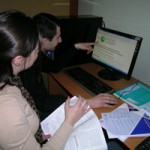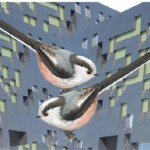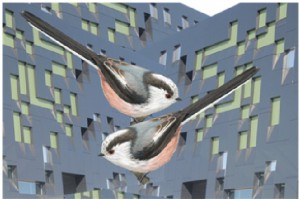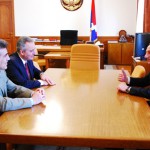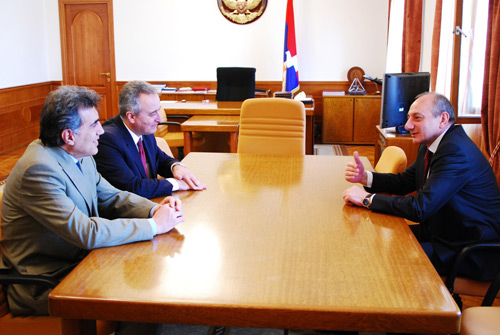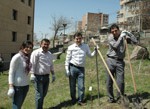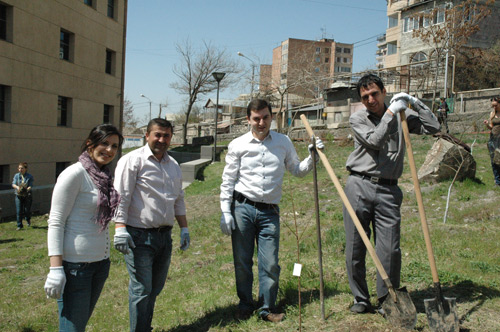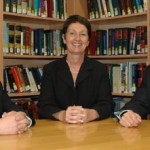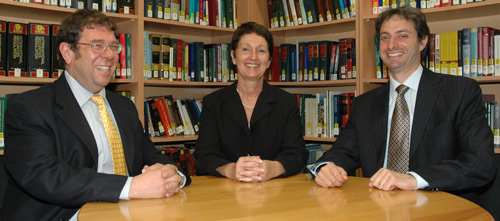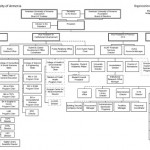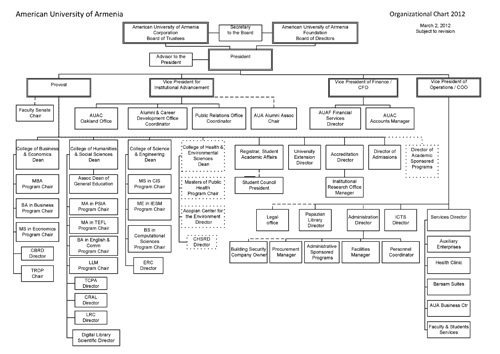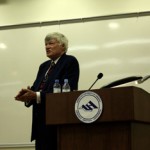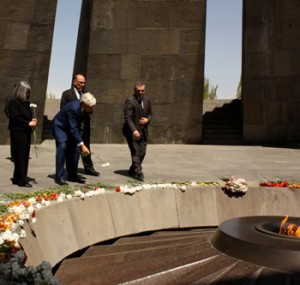Faculty Scholarship and Research
Assistant Professor of Political Science and International Affairs Syuzanna Vasilyan presented two papers at the annual meeting of the International Studies Association in San Diego, CA. The titles of the papers were “The EU as ‘Moral Power’ through its Democracy Promotion Policy in the South Caucasus” and “The EU has a ‘Moral Power’ through its Regionalization of the South Caucasus.”
Arthur Martirosyan, Director of the Centers for Excellence in Negotiation (CEN) was featured in a new program by Mediamax News Agency, entitled “50 Global Armenians.” CEN-Yerevan is part of the AUA Legal Resources Center. Martirosyan has guest lectured at AUA and will be making presentations to negotiation classes in the School of Business Management and Law Department this spring. He also facilitated the university’s 2011-2017 Strategic Planning Session during the summer 2011.
AGBU Young Professionals Donate to AUA Digital Library Holdings
Since 2001, the AGBU Young Professionals (YP) Network has lent its financial support to the American University of Armenia (AUA) in Yerevan by sponsoring its annual subscription to the Association for Computing Machinery (ACM) Digital Library. More than a decade later, the giving continues with support provided this year by YP Boston, YP Greater New York, YP Lebanon, YP Los Angeles, YP Orange County, and HAIK, a YP Partner organization in Frankfurt, Germany. In total, AGBU YP Groups and Partners have donated nearly $25,000 to this endeavor over the years.
“It is important for the AGBU Young Professionals to support AUA graduate students in their efforts to pursue their studies,” says YP Orange County Chairwoman Dora Gulesserian, whose group donated for the first time this year. “The ACM Digital Library is an invaluable resource in providing knowledge about the computing industry and we are happy to be able to direct funds to this important cause.”
Advancing the educational and research efforts of AUA graduate students and faculty, the ACM Digital Library is the ultimate resource to the computing industry, providing a vast collection of citations and full texts from current and archival journals, articles, and conference proceedings, both in print and online.
“I can attest to the importance of our students having access to inspirational information in their field of expertise,” shares Aram Hajian, Dean of the AUA College of Engineering. “The AGBU YP donation has helped enable our students to be aware of the most up-to-date scientific scholarship in computer science through the ACM subscription. I am happy to express my thanks and appreciation to the AGBU Young Professionals on behalf of the AUA College of Engineering. We highly value such examples of Diasporan support for Armenia’s institutional development and for AUA in particular.”
ACM is the world’s largest educational and scientific computing society, uniting educators, researchers, students, and professionals to inspire dialogue, share resources, and address the field’s challenges. Access to the latest publications via the ACM Digital Library is essential for AUA graduate students and faculty to further their scholarship and stay abreast of the changing trends in computing and information technologies.
“We are grateful to have the committed support of the global network of the AGBU Young Professionals,” remarked Dr. Bruce Boghosian, President of AUA. “The AGBU YP sponsorship of the ACM has been steadfast over the years.”
Caption: AUA graduate students accessing online and in print the ACM Digital Library, which is sponsored annually by the AGBU Young Professionals to support their studies.
Established in 1906, AGBU (www.agbu.org/yp) is the world’s largest non-profit Armenian organization. The AGBU Young Professionals (www.agbu.org/yp) is a growing network of groups and supporters around the world who are committed to preserving and promoting the Armenian identity and heritage through educational, cultural and humanitarian programs for young Armenians between the ages of 22 to 40.
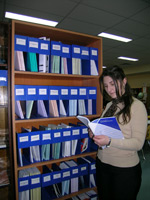 |
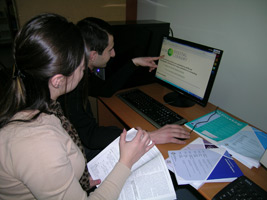 |
The American University of Armenia (AUA) is a private, nonsectarian, independent university located in Yerevan, Armenia. Founded in 1991, AUA is affiliated with the University of California and is accredited by the Western Association of Schools and Colleges. Through teaching, research, and public service, AUA serves Armenia and the region by supplying high-quality education in seven different major fields, encouraging civic engagement, and promoting democratic values. For more information, please visit www.aua.am.
AUA Partners with the United Nations University on Urban Biodiversity Guidelines
AUA has partnered with the United Nations University’s Institute of Advanced Studies (UNU-IAS) to test guidelines designed to preserve and restore biodiversity in urban areas through a month-long summer course in Yerevan. The biodiversity guidelines were developed in cooperation with other international organizations and are being piloted in 10 cities worldwide. As part of this multi-city initiative, AUA has organized a summer studio course during which young professionals and graduate students will test the urban biodiversity guidelines in Yerevan. The studio course will be led by the College of Engineering (CoE), Acopian Center for the Environment (ACE), and UrbanLab Yerevan. For more information or to register, contact Alen Amirkhanian at the CoE, [email protected].
Vice President of Operations Meets with Nagorno-Karabakh President
Last month Vice President of Operations Ashot Ghazaryan met with Nagorno-Karabakh President Bako Sahakyan as part of AUA’s ongoing efforts to recruit more students from Nagorno-Karabakh. During the meeting President Sahakyan emphasized the importance of AUA. He underscored the need for providing Armenian students access to high-quality education. During his visit to Nagorno-Karabakh, Ghazaryan also met with Prime Minister Arayik Harutyunyan and Minister of Education and Sciences Vladik Khachatryan.
300 Trees Planted in Celebration of Earth Day
On Saturday, April 14, in celebration of Earth Day, over 100 students, staff, faculty and alumni planted more than 300 trees and bushes, and cleaned the park directly behind the university. For the last several years, AUA has planted trees and shrubs, and cleaned the public park. The trees and bushes were donated by long-time AUA partner the Armenia Tree Project NGO.
AUA Announces Dean and Associate Dean Appointments
Interim Provost Armen Der Kiureghian announced three senior academic appointments to coincide with the university’s new academic restructuring into three Colleges: Dr. Aram Hajian, Dean of the College of Science and Engineering, Dr. Thomas J. Samuelian, Dean of the College of Humanities and Social Sciences, and Dr. Catherine Buon, Associate Dean of the College of Humanities and Social Sciences for General Education.
Dr. Hajian received his Ph.D. in Engineering Sciences from Harvard University in 1997 and B.S. in Mechanical Engineering from Stanford University in 1991. He joined AUA in the summer of 2007 as the Assistant Dean of the College of Engineering, becoming Interim Dean in 2008 and Dean of the same college in 2010. He has served as Chair of the Faculty Senate and of the Undergraduate Task Force and as member of several other academic governance bodies, including the Curriculum Committee and the WASC Steering Committee. The author of a number of publications on mechanical models of human grasp, Dr. Hajian has taught several courses to students in both Industrial Engineering and Systems Management and Computer and Information Science programs of the College of Engineering. He has also served as a technical reviewer and member of several Armenian Government-appointed committees related to large-scale national engineering development projects, including the Prime Minister’s Committee for the North-South Road Corridor Investment Program. Dr. Hajian is a co-founder and member of the Board of Directors of the Chess Academy of Armenia and has organized several international chess tournaments, including the Grand Prix Events in Jermuk (2008, 2009), the Karabakh International tournaments (2004, 2005), and in 2004 the first elite-level internet-based team tournament. He is a member of the Armenian Chess Federation, heading its Computer/IT committee.
Dr. Samuelian has been in academe for over three decades, beginning his teaching career at the University of Pennsylvania, where he earned his Ph.D. in Linguistics in 1981. He has also taught at Columbia University and St. Nersess Seminary. In 1991 he earned his J.D. from Harvard Law School. After serving as a clerk in US federal court, he practiced international law in Washington, DC, Almaty, and Moscow. He is founder and managing partner of Arlex International CJSC, which has handled many of Armenia’s largest complex investment transactions and contributed to legal reform and the development of the legal profession. He is a licensed member of the Armenian bar. He joined the AUA Law faculty in 1998 and has served as the Dean of the AUA Law Department since 2006. In 2011, he was appointed Accreditation Liaison Officer, guiding AUA’s strategic planning, reaccreditation and new program accreditation process. Dr. Samuelian is the author of a number of books, articles, reviews, and translations in the field of Armenian language, literature and history, including an English translation of St. Gregory of Narek’s Book of Prayers: Speaking with God from the Depths of the Heart (www.stgregoryofnarek.am), a two-volume Course in Modern Western Armenian, Dictionary of Armenian in Transliteration, and Cultural Ecology and Gorbachev’s Restructured Union, 32 Harv. Intl.L.J. 159 (1991). At the Arak-29 Foundation, a Yerevan-based foundation dedicated to Armenian cultural and economic renewal, Dr. Samuelian is team leader for the award-winning www.arak29.am portal. Arak-29 features free Armenian language learning and linguistic tools, Armenian language-learning software programs, spell-checkers, Armenian cultural literacy educational software, Genocide reparations databases, translations, and articles on economic, literary, cultural policy, and environmental issues. He has served as President of the US-based Armenian Bar Association, President of the American Chamber of Commerce in Armenia, and as one of two international experts for Armenia’s Anti-corruption Strategy. He also headed the RA Ministry of Education Committee for the 2011 English Language Olympiad.
Dr. Buon was born and raised in Northern France. She earned a BA in English Language and Literature at the Université d’Angers, France, where she also obtained a BA in Teaching French as a Foreign Language. After moving to the USA, she earned an MA in French and Francophone Literatures, and a PhD in Applied Linguistics from Louisiana State University, USA. Dr. Buon is an applied linguist, language specialist, teacher trainer, and administrator with a passion for languages, world cultures, and pedagogy. Her research interests lie primarily in the areas of foreign language reading and writing, curriculum design, and teaching methods.
After teaching French as a Foreign Language and English as a Second Language at the undergraduate and graduate levels for many years in U.S. universities, Dr. Buon’s professional career took her around the world teaching English as a Foreign Language in the Middle East and Cyprus; training EFL teachers in Singapore, Vietnam, Thailand and Indonesia; and now in Armenia. Dr. Buon’s administrative experience spans a period of over 15 years. She has held positions as Language Program Coordinator, Exam Coordinator, Foreign Languages Department Head, Assistant Dean, Associate Dean, and Interim Dean at various institutions of higher learning around the world. She joined the AUA faculty in 2010 as Assistant Dean in the Department of English Programs and has served as Interim Dean since January 2012.
The promotions of Drs. Hajian, Samuelian, and Buon will become effective with the university’s new academic structure on July 1, 2012.
Drs. Thomas J. Samuelian, Catherine, Buon, and Aram Hajian
AUA Restructures its Academic and Research Programs
On April 23, Interim Provost Der Kiureghian announced a major restructuring of the organization of academic and research units of AUA. The new organizational structure is a result of extensive discussions involving a broad spectrum of the University community, starting during the strategic planning meetings in the summer of 2011 and continuing through the fall and winter quarters of the current academic year. The details of the new organizational structure were worked out during a series of meetings of the university administration including the president, the provost and vice presidents of finance and operations. The Board of Trustees of the University has endorsed the reorganization plan, which will become effective July 1, 2012, in anticipation of the start of three new undergraduate programs and one graduate program in the fall of 2013.
The new organizational structure collects the academic units of the University in three Colleges: The College of Business and Economics (CBE), the College of Humanities and Social Sciences (CHSS), and the College of Science and Engineering (CSE). The CBE will house the existing MBA programs, the planned MS program in Economics, the planned BA program in Business, as well as the Center for Business Research and Development (CBRD). The CHSS will house the existing master’s programs in Law, Political Science and International Affairs, and Teaching English as a Foreign Language, the planned undergraduate program in English and Communications, as well as three research centers: the Legal Resource Center (LRC), the Turpanjian Center for Policy Analysis (TCPA), and the Center for Research in Applied Linguistics (CRAL). The CHSS will also oversee General Education courses of the undergraduate programs. The CSE will house the existing master’s programs in Industrial Engineering and Systems Management and in Computer and Information Science, the planned undergraduate program in Computational Sciences, and the Engineering Research Center (ERC). The disposition of the master’s program in Public Health as well as the Center for Health Services Research and Development (CHSR) and the Acopian Center for the Environment (ACE) is still under discussion. One possibility is that an expanded Public Health program together with the two centers will form a fourth college, tentatively named the College of Health and Environmental Sciences.
The new organizational structure offers significant advantages. First, it is a scalable model that will allow the University to grow as it introduces new programs, both at the undergraduate and graduate levels. Second, having multiple academic programs within the umbrella of a single college will enhance interdisciplinary teaching and research, which are keys to high-quality education and scholarship. In fact, to further encourage interdisciplinary interactions, artificial boundaries between the disciplines will be avoided by not creating departments for the degree programs. Rather, the faculty within each college will “belong” to the college and not to the specific degree programs. However, each degree program will have a “Program Chair,” who will work with the dean of the college to administer the teaching and curricular activities of the program. This structure will foster interactions among the faculty with diverse backgrounds and create an environment that encourages collaborative teaching and research. Third, the new structure will enhance the diversity of the teaching programs. The present “silo-like” organizational structure of the degree programs into separate departments and colleges does not allow recruitment of full-time faculty. This is because programs are small and no individual instructor can teach more than a few of the diverse set of courses within the program; furthermore, it is not desirable for students to take too many courses from the same instructor. Collecting a set of degree programs into a single college will allow sharing of faculty resources. As a result, students will benefit by experiencing a more diverse set of faculty expertise and teaching styles. No doubt, the new organizational structure will also enhance interactions among students with diverse backgrounds. Finally, the new structure will allow sharing of human and material resources for both degree programs and research centers, thus permitting economies of scale and growth.
In his April 23 letter, the Provost also announced the following appointments effective July 1, 2012:
Dr. Tom Samuelian as the Dean of the College of Humanities and Social Sciences,
Dr. Aram Hajian as the Dean of the College of Science and Engineering,
Dr. Catherine Buon as the Associate Dean of CHSS for General Education.
A search for the Dean of the College of Business and Economics is currently underway. Program Chairs for each of the degree programs will be appointed in due time. All these academic leaders will serve in residence.
“We strongly believe that the new organizational structure will significantly enhance the quality of our teaching and research programs and improve our academic administrative operations,” says Interim Provost Der Kiureghian. President Boghosian adds, “Our strategic plan calls for a fourfold increase in our student population and a threefold increase in the number of our faculty by 2017. It was important to put in place an organizational structure that could scale with that kind of growth. At the same time, it is important for all to realize that none of our existing degree programs are changing. We will continue to offer all of the master’s degrees we do now, and more. The changes are designed to ensure that the students in those programs are exposed to more faculty, and more interdisciplinary scholarship. The goal is to create a richer educational experience for all our students.”
Click the image to enlarge
International Human Rights Lawyer Geoffrey Robertson Delivers Groundbreaking Talk
by Laura Boghosian
YEREVAN – In a wide-ranging lecture at the American University of Armenia (AUA), international human rights lawyer Geoffrey Robertson QC accused Turkey’s Minister for European Union Affairs of lying, endorsed Armenian calls for reparations and restitution, and declared the Armenian Genocide is not a subject for historians, but a matter for legal judgment.
Robertson, whose specialties include constitutional, international, human rights, civil liberties and media law, is founder and head of Doughty Street Chambers, a leading human rights law practice in London.
Robertson also served as a judge and president of the United Nations Special Court for war crimes in Sierra Leone. In 2008, the Secretary General appointed him as Distinguished Jurist on the United Nations Internal Justice Council.
Invited to Armenia by AUA, Robertson spoke April 23 on “Why Armenian Genocide Deniers Are Wrong.” A panel discussion, moderated by dean of AUA’s law department Thomas Samuelian, followed his address; panelists were Robertson; Armenian Genocide Museum-Institute Director Dr. Hayk Demoyan; and Dr. Yeghishe Kirakosyan, a founding member of the Yerevan-based International and Comparative Law Center.
“Thinking About Thinking”
The event, entitled “A Legal Lens on Genocide,” was the third in the “Thinking About Thinking” lecture series co-sponsored by AUA and the Luys Foundation.
In his opening remarks, AUA President Bruce Boghosian explained that the purpose of “Thinking About Thinking” is to propose new ways of thinking about various topics, even the Armenian Genocide.
Discussion about the Armenian Genocide is moving away from appeals to morality and toward the realm of law, he said, with lawsuits in recent years focusing on insurance claims and the return of property such as churches and land.
Boghosian stated that as genocide deniers persist in their arguments against objective reality, Armenians must study their evolving tactics, which he compared to the methods used by those who deny climate change or evolution.
“Another way in which discourse about the Armenian Genocide is changing,” said Boghosian, “is the movement away from regarding it as an isolated historical event, and toward understanding it as a historical process.”
Boghosian observed that the Armenian Genocide “began many years before 1915, intensifying with the massacres, economic deprivations and depopulation strategies of the nineteenth century.” And since genocide scholars characterize denial as the eighth and final stage of genocide, “it is ongoing” since Turkey continues to deny the genocide.
The Armenian Genocide, therefore, “has the dubious distinction of being one of the longest ongoing genocidal processes in human history,” said Boghosian. “The Armenian Genocide is therefore not an event, but a process — a process fueled, as genocides are, by racial hatred and designed to rid the historical Armenian homeland of Armenians.”
This genocidal policy continues to the present, he charged, with the Turkish blockade of Armenia’s borders “in an attempt to further strangle it and induce emigration.”
“We are no longer simply asking for genocide recognition,” he concluded. “We’re demanding that the genocide stop.”
Turkish Minister’s lies
Robertson began his talk by sharing an indirect connection to the Armenian Genocide. An Australian by birth, Robertson’s great uncle William was one of the thousands of Australians killed at the battle of Gallipoli.
“He had no idea that that landing would be used as an excuse, as a trigger, for the roundup of Armenian teachers and lawyers, poets and intellectuals in Constantinople to begin a murderous operation so much more heinous than the crimes committed in ordinary warfare,” he said.
“Genocide is different,” Robertson stated, and it “cannot and should not be forgiven unless and until the nation that is responsible for it acknowledges that responsibility for the worst of all crimes and makes amends, as Germany has by now made amends for the Holocaust.”
Unlike the judgment at Nuremberg, “We have had no judgment on the Armenian Genocide, and perhaps it is time that we did judge it, because the nation responsible for it can not bring itself to own up, cannot recognize that what it did to the Armenian community in 1915 was not just mass murder, not just a crime against humanity, but was motivated by a desire to extinguish a race.”
Rather than acknowledging the Armenian Genocide, Robertson reported that just the week before Turkey’s Minister for European Union Affairs Egemen Bagis told “a shocking lie,” when he claimed that Turkish officials were acquitted of massacring Armenians by a British judge in Malta.
“This is a lie, a pack of lies that must be unpacked.” There was “no difficulty at all in proving their guilt,” Robertson said, but “as international law then stood in 1919, a government and its officials could not be prosecuted for ordering the deaths and deportations that killed at least a million Armenians . . . They were not acquitted, they just couldn’t be tried.” The Turkish prisoners were eventually exchanged for British hostages captured by Kemal Ataturk’s nationalist forces.
It was not until the 1945 Nuremberg trials and the United Nations Genocide Convention of 1948 that a legal framework emerged for prosecuting government officials accused of slaughtering their own people, Robertson explained.
“The very idea that the Armenian massacres didn’t amount to genocide would have amazed Raphael Lemkin, the architect of the Genocide Convention,” said Robertson. In fact, it was because no one was punished for these massacres that Lemkin, who later coined the word “genocide,” began advocating for such a law.
“He studied the Malta proceedings and he realized that the law needed a new crime to cover the mass murdering of their own people by military and political officials,” said Robertson. “In his crusade for the crime of genocide from 1933 onward, it was always the Armenians that he used as the example for why we needed a law.”
“There is no doubt among lawyers today that the Genocide Convention was written on the backs and through the blood of those million or so Armenians who died,” he added.
The Armenian Genocide
In 2008, Robertson was asked by the London-based Armenian Centre to determine whether the Turkish deportations and massacres of Armenians beginning in 1915 constituted genocide under the standards of international law. The United Kingdom, like the United States, refuses to officially recognize the Armenian Genocide.
“I came to the conclusion that, beyond any shadow of doubt, the events of 1915 would be characterized as genocide today,” he said. “The evidence was overwhelming.”
Unless it acknowledges the Armenian Genocide, Robertson declared, “Turkey must not, and I hope will not, be allowed to join the European Union.”
Robertson then described how genocide law is evolving. “Genocide courts have been developing international criminal law in the last ten years . . . we have been refining, defining and developing the law of genocide in ways that bear directly on the issue of whether you can characterize the events of 1915 as genocide.”
Specifically, rulings interpreting the Genocide Convention by the International Criminal Tribunal for Rwanda (ICTR) are relevant to the Armenian deportations, particularly the convention’s article 2-c that defines genocide as “deliberately inflicting on the group conditions of life calculated to bring about its physical destruction in whole or in part.”
“The other issue that we’ve dealt with in The Hague,” said Robertson, “is the question of what amounts to genocidal intent.”
Genocide deniers and “proof”
Robertson skewered genocide denying historians Justin McCarthy, Bernard Lewis and Heath Lowry for their argument that there are no documents that “prove” the Armenian Genocide.
“They have this concept of genocide being proved, of genocidal intent, being proved by an order that is written down. ‘Where is the order for destroying the Armenians?’ they say. There is no order written down by Hitler for destroying the Jews. There was no order written down by the Hutus for destroying the Tutsis. This is ludicrous. This is a ridiculous idea which is at the heart of a lot of the arguments of the genocide deniers. The courts in The Hague over the last few years have constantly ruled that the intention necessary for genocide can be inferred from other factors,” he stated.
The International Criminal Tribunal for the former Yugoslavia (ICTY) actually held that the existence of a plan or policy is not a legal ingredient of the crime, according to Robertson.
To illustrate how historians are ignorant of the legalities of genocide, Robertson read from the writings of Justin McCarthy, who admits that half a million Armenians died, but argues that Armenians died from sickness, exhaustion, and attacks of marauders on “rich convoys.”
“ICTY jurisprudence makes it absolutely crystal clear that any government that orders deportations knowing that people will die from sickness, exhaustion following long marches, etc. will be guilty of genocide,” said Robertson. “McCarthy just doesn’t understand the laws of genocide.”
“But notice the language . . . the rich convoys . . . what is he trying to say? That these people died because they were rich and they had all their rich objects on their backs? It’s very distasteful, disgusting, I think. And it does show the extent to which Professor McCarthy has become a propagandist, and a vey unattractive one . . . As far as McCarthy is concerned, I think we can see him as a rather perverse propagandist for the Turkish government.”
Governments like that of Turkey, the United States, and the United Kingdom that call for the matter to be decided by historians are wrong, stated Robertson.
“They say this is a matter for historians. It’s not. Historians… are utterly ignorant of what genocide is in law. It’s not a matter for historians. Genocide is a matter for judges. But we hear time and again, this is a matter for historians.”
The Armenian government is right to reject calls for the genocide to be studied by a panel of historians as described in the Protocols, said Robertson.
Genocide equivocating governments
Robertson called governments like that of the United States and the United Kingdom that do not recognize the Armenian Genocide for political and commercial reasons “genocide equivocators.”
Robertson then described how the “genocide equivocating” British government claimed that the evidence was not “sufficiently unequivocal” to characterize the Armenian massacres as genocide.
Secret government documents obtained through the Freedom of Information Act during his legal examination of the Armenian Genocide revealed the true reasons for the UK’s position. Memoranda clearly stated that political and commercial relations with Turkey were the reasons for the government’s admittedly unethical policy, given Turkey’s “neuralgic” reaction to charges of genocide.
“So there it is, in black and white. We’re lying, we’re being unethical,” admonished Robertson, “but we need Turkey [which] is crazed, insane, when it comes to allegations of genocide.”
In his 2009 report, Robertson accused the Foreign Office of misleading Parliament on the Armenian Genocide.
Reparations and restitution
Robertson next discussed legal tools, such as the U.S. Alien Tort Claims Act or the European Court of Human Rights, which Armenians might employ for reparations and restitution of property taken by the Turkish government during the genocide.
“The laws that confiscated and appropriated Armenian property, they’re still available today for actions for restitution,” he said.
“The issue of the Armenian Genocide can no longer be left to history. It certainly can’t be left to historians,” he concluded. “It is a matter for judgment, applying the developed law of genocide to the evidence. And in my judgment, there can only be one outcome.”
Panel discussion
Hayk Demoyan opened the discussion by pointing out that Turkey began its genocide denial as early as 1915-16, when it published books with photos of Armenian victims re-captioned as Muslim dead.
Turkey, he said, is preparing for 2015 with new skills and more sophisticated approaches to deny “the historical and legal facts of the Armenian Genocide,” such as hiring and paying new academics, establishing new chairs, and restoring Armenian monuments as part of the general plan.
Yet despite the favorable international publicity reaped by Turkey with the restoration of Aghtamar, other Armenian cultural monuments are being systematically destroyed.
Demoyan said that metal detectors are being openly sold in Turkey with written instructions in Turkish that say if you want to find treasure, you should search for it in the foundations of Armenian churches or on the land of former Armenian cemeteries. In Ani last year, an Armenian queen’s burial site was desecrated, khatchkars were broken to pieces and tombstones crushed, he said, yet “no one is punished.”
Demoyan charged that current Turkish officials continue the genocide by not punishing, for example, the policemen who posed with Hrant Dink’s assassin and by blockading the border. When a country imposes a military blockade, he stated, the next step is a declaration of war.
“Armenian statehood for Turkish leadership always was anathema,” said Demoyan, adding he believes that the border is closed not due to Azerbaijan, but rather by a fear of the existence of Armenians on ethnically cleansed Armenian territories.
Later, in the question and answer period, Demoyan said Armenians must be ready if Turkey decides to recognize the genocide.
If Turkey accepts the historical facts, it would have to accept the “legal responsibilities for crimes committed,” said Demoyan.
The challenge will be for Armenians to agree on what we want, he said.
“We cannot speak with different languages. We cannot claim different things. We have to claim a common thing,” he concluded. “Genocide is a crime and there are still consequences of this crime. And these consequences must be eliminated . . . We have to be ready . . . with a common agenda. State and diaspora structures must [work] together in order to develop one language, one claim.”
Yeghishe Kirakosyan began his remarks by examining recent scholarship on the concepts of state responsibility and state succession as determined by the Permanent Court of International Justice and other international tribunals.
Modern Turkey could be held responsible, he said, for violations that took place at the beginning of the twentieth century and could be brought to justice. Kirakosyan explored the various avenues open to Armenians to pursue claims against Turkey, such as state claims commissions and international courts.
Moderator Tom Samuelian observed that many countries have benefitted from the Armenian Genocide and its denial and asked, “Why not make them all pay?”
The discussion was concluded by Geoffrey Robertson who declared, “There has to be restitution… We all want reconciliation… but you cannot have reconciliation without truth and acknowledgment of truth.”
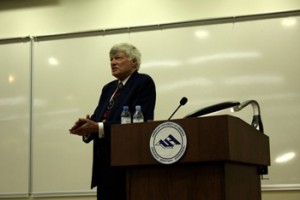 |
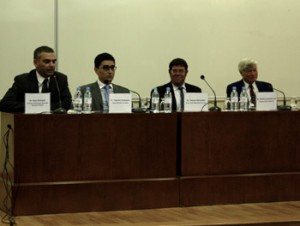 |
Visit to Armenian Genocide Memorial and Museum-Institute
Earlier in the day, Boghosian and AUA’s leadership team escorted Robertson to the Armenian Genocide memorial where he laid flowers. In a televised joint press conference, museum director Demoyan presented Robertson with the Fridtjof Nansen Medal for his legal examination of the Armenian Genocide. The medal is named in honor of Nansen, a Norwegian humanitarian and Nobel Peace Prize Laureate, who aided Armenian refugees following the genocide. Also receiving a medal was Jussi Bjorn, who recently discovered memoirs describing the 1915 Moush massacres handwritten by his grandmother, Norwegian missionary Bodil Katharine Bjorn.
Geoffrey Robertson
One of Robertson’s many books is Crimes Against Humanity: The Struggle for Global Justice, which analyzes the development and application of international human rights law and opens with Hitler’s quote dismissing the Armenian Genocide as a forgotten event.
Mr. Robertson has argued cases before the European Court of Human Rights, the Privy Council and the House of Lords, and has appeared in cases in countries around the world, including Hong Kong, Malawi, Fiji, Singapore, New Zealand and Australia.
Mr. Robertson has led numerous human rights missions to countries such as South Africa and Vietnam on behalf of Amnesty International and is visiting professor in human rights at Queen Mary College, University of London.
Over twenty years ago, Robertson successfully defended author Salman Rushdie when British Muslims brought a suit alleging blasphemous libel following the publication of The Satanic Verses. Robertson also hid Rushie in his home after Iran’s Ayatollah Khomeini called for Rushie’s assassination.
Today, Robertson, who holds dual British and Australian citizenship, represents fellow Australian Julian Assange, editor-in-chief of Wikileaks.
Additional information
To view the entire lecture and panel discussion, visit: http://webcam.aua.am/
To read Mr. Robertson’s report “Was There An Armenian Genocide?” visit: http://www.doughtystreet.co.uk/files/Armenian%20genocide1.pdf


